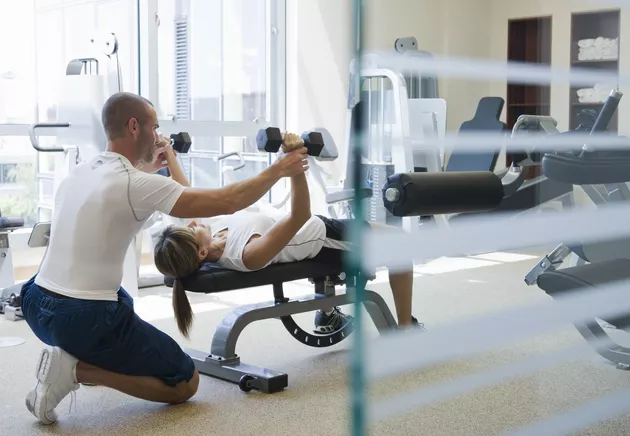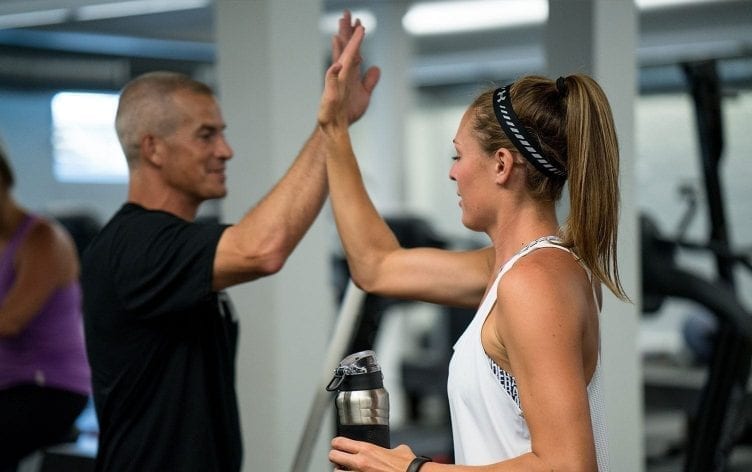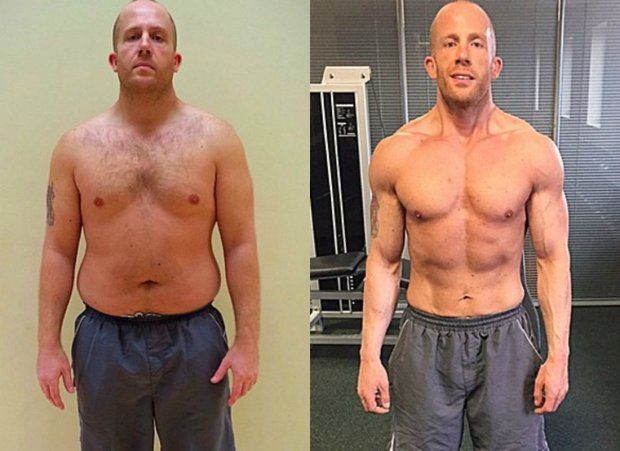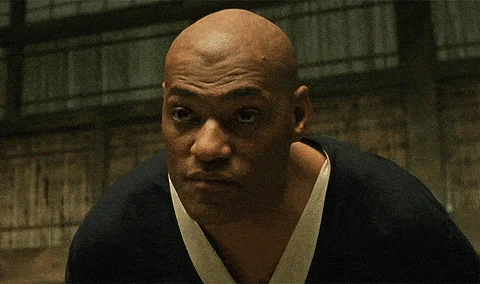Prior to investing in a personal trainer, take a look at this comprehensive guide!
It will assist you in distinguishing between an ineffective personal trainer and an EXCEPTIONAL one.
Believe us, having the right trainer can significantly impact your fitness journey. Believe us, having the right trainer can significantly impact your fitness journey.
Nothing is more disheartening than spending over 6 months in the gym (and thousands of dollars) with a trainer, only to step on the scale and realize that you’ve made no progress.
In my 7 years of experience, I’ve encountered both proficient and inadequate trainers. Since 2014, I’ve been working with the same online Scarborough Personal Trainer, and we also have a team of 10 personal trainers.
In a nutshell, we are well-versed in this field and will provide you with candid advice.
Regardless of whether you’re interested in exploring our 1-on-1 Online Training Program, this guide is packed with valuable insights to assist you.
In this guide, we will delve into the positive aspects, the drawbacks, and the less favorable aspects of personal trainers, whether they’re working in-person or online:
- 1) What do you need from a personal trainer?
- 2) How to find a good personal trainer.
- 3) What are the signs of a bad personal trainer?
- 4) What certifications should a personal trainer have?
- 5) How much does a personal trainer cost?
- Pros and cons of hiring an online personal trainer.
- How to hire a personal trainer: next steps.
What do you need from a personal trainer
In the video above, Coach emphasizes a crucial question to consider when hiring a personal trainer: Do they align with your objectives?
That means you need to establish your goals upfront!
Begin by identifying your goals, then assess if the trainer you’re considering is a suitable match for you. It’s similar to dating; you might meet someone amazing, but they might not be the right fit for you.
Just as a competitive marathon runner may not be the best powerlifting coach, and vice versa.
So, commence with defining your objectives for finding a personal trainer:
- Are you aiming to shed 300 pounds, 20 pounds, or reach 10% body fat?
- Do you aspire to gain strength or achieve your first handstand?
- Is becoming a competitive powerlifter your ambition?
- Are you working towards completing your first 5k run?
- Are you primarily focused on getting fit, feeling better, and enjoying exercise?
These goals will significantly influence the type of trainer you should seek.
COMMON MISTAKE #1: Neglecting to ensure your trainer possesses expertise in your desired training area.
Being an expert in one domain doesn’t necessarily translate to being a good fit for another!
Following this, consider what you REQUIRE from your personal trainer:
- Are you seeking a powerlifting coach to guide you through the fundamentals (squat, deadlift, bench) and ensure correct form? Perhaps a few initial sessions and periodic check-ins might be sufficient.
- Are you a newcomer to the fitness scene, aiming to kickstart your first two months of training with two sessions per week to stay disciplined?
- What kind of individual are you? Do you thrive with hands-on guidance during your workouts, or do you prefer the space to take charge and succeed independently? Do you need someone to motivate you, or do you benefit from a trainer who provides tough love and holds you accountable?
Once you establish clear expectations regarding your preferences and the duration you’ll require a trainer, you can select one that will hopefully be the right fit for you.
How to find a good personal trainer

After identifying a potential trainer to collaborate with, the subsequent essential step involves engaging in a comprehensive conversation.
COMMON MISTAKE #2: Accepting your trainer’s guidance without ensuring compatibility!
- They MUST listen attentively, taking in your complete story.
- They MUST inquire about any prior injuries or exercise experience you may have had. Understanding your injuries or limitations enables them to design an effective program tailored to you.
- They MUST discuss your nutritional habits. Failure to do so would be a waste of your time.
- They MUST practice what they advocate for. While not necessitating Olympic-level fitness, they should embody a healthy lifestyle.
- They MUST inform you about their expertise and how they can assist you. Sharing past client success stories or presenting their credentials and track record of achievements is important.
- They MUST establish realistic expectations. You won’t achieve a chiseled physique in a month, but they can inform you that it may take several months to achieve fitness goals or develop the right habits.
These are the aspects to consider. Our focus in our personalized online coaching program centers around these points. We take joy in assisting individuals in a manner that aligns with their lifestyle, at a pace that suits them, all while making the process enjoyable.
What are the Signs of a bad personal trainer?
Be cautious of trainers promoting ‘entertainment exercise’ routines that don’t align with your objectives.
COMMON MISTAKE #3: Assuming a workout is more effective just because it’s complicated.
Many trainers attempt to perplex clients with unnecessarily intricate exercises, sticking everyone to a nearly identical, generic regimen.
Why? Because it creates an illusion of expertise without needing to be truly effective:
“Now, maintain your balance on this bosu ball while performing these convoluted dumbbell squat lunges and standing on one foot with your tongue out! Muscle confusion!
I hope you’ve saved some energy for the rowing machine.”

Ensure that your personal training regimen aligns with your goals!
Challenging workouts are beneficial, but remember, while it’s simple to exhaust someone with “do 100 burpees!”, it’s more challenging to help someone steadily progress and gain momentum.
Certainly, it may elevate your heart rate and fatigue you, but if it doesn’t contribute to your goals in a manner unique from what you could achieve at home, what’s the value of what you’re investing in?
Moreover, they might possess only a basic certification and halt their education there, relying on ‘conventional wisdom’ rather than conducting thorough research and accumulating experience.
If your trainer utters any of these phrases, be cautious:
- “Yeah, don’t squat too low; it’s detrimental to your knees.”
- “Use this machine; it’s safer for you than free weights” (unless you have an injury)
- “Yes, you should mainly engage your back. That’s why it’s called the back squat.”
- “These (ab) exercises will swiftly melt fat from your stomach” (Spot reduction of fat isn’t possible.)
I’ve personally heard all these catchphrases from genuine trainers at actual gyms, and it moved me profoundly, much like the Native American in the 1970s pollution ad.
Your trainer should prioritize achieving results rather than merely focusing on booking additional sessions and keeping you in the loop.
I frequently observe clients working with trainers for extended periods, and yet, the client’s physical appearance remains unchanged.
The trainer’s main concern seems to be cashing in on another payment.
Always remember, your personal trainer is hired by YOU: Ensure they tailor a program that genuinely meets your requirements!
- Do they modify your workout routine to accommodate any existing injuries you may have, or do they simply provide a generic workout plan?
- Are they genuinely supportive and assisting you in achieving your desired success, or are they distracted, scrolling through Instagram models while you complete your sets?
- Are they investing time to witness your progress and results, or are they just fulfilling the time to tick a box and collect their fee?
You’re investing your money for this person’s expertise and attention – it’s reasonable to expect someone who treats these aspects with due seriousness.
What certifications should a personal trainer have?

There’s a diverse range of certifications and credibility indicators for personal trainers.
The conventional route, such as a degree in exercise science or kinesiology, can indicate the trainer’s knowledge of the human body. However, it doesn’t necessarily reflect their experience in coaching under real-world circumstances.
Here are six popular personal trainer certifications:
- NSCA: National Strength and Conditioning Association
- ACSM: American College of Sports Medicine
- NASM: National Academy of Sports Medicine
- ACE: American Council on Exercise
- NPTI: National Personal Training Institute
- CrossFit
NSCA and NASM offers a comprehensive review of the pros and cons from a trainer’s perspective, which can provide valuable insights from a client’s standpoint. Feel free to explore it to better understand the foundation of your trainer’s certification.
CrossFit certifications can be obtained over a single weekend. While holding a CrossFit certification doesn’t necessarily indicate a trainer’s incompetence (as there are many exceptional CrossFit coaches), it also doesn’t guarantee excellence.
NPTI offers a certification obtained through formal education in personal training (as opposed to a single class or exam). Although no certification can assure absolute excellence, we believe trainers with NPTI certifications deserve consideration.
IMPORTANT NOTE: Many phenomenal trainers have no certification, while others with elite certifications may not be effective trainers.
MISTAKE #4: Blindly accepting or dismissing a trainer based solely on their credentials.
Certifications serve as a starting point but shouldn’t be the sole determinant.
One of the most crucial qualities to seek in a trainer is not just a credential or certification, but genuine experience and a passion for assisting you in achieving your objectives.
For instance:
- Looking to shed a substantial amount of weight? Request success stories from the trainer featuring clients with similar weight loss goals.
- In our opinion, finding a trainer with a proven track record and experience in the area aligned with your goals is the most valuable step towards ensuring quality.
Interested in powerlifting or Olympic lifting? Seek out someone who has successfully competed in these domains or coaches athletes who compete in them!
The certification is merely a starting point.
Trainers come at a cost, but the benefits they provide are invaluable.
Remember, you’re not just paying for their time spent with you. You’re investing in the years they’ve dedicated to learning, training, and coaching.
It’s the years of dedication and experience behind the certification that give value to their time. Hence, expect the cost of a trainer to be considerably more than a basic gym membership.
How much does a personal trainer cost? Are Personal Trainers Worth it?
The cost of hiring a personal trainer can fluctuate significantly based on several factors:
- Location (living in an expensive city, a smaller town, etc.).
- Frequency and duration of training sessions.
- Type of training you’re seeking.
- However, let’s delve into the specifics.
On average, a personal trainer in North America charges around $55 per hour session.
To provide a breakdown, here are the prices for personal training at a typical commercial gym in the NYC area (which tends to be on the pricier side):
- 4 sessions per month: $95 per session = $380/month
- 8 sessions per month: $85 per session = $680/month
- 12 sessions per month: $79 per session = $948/month
How do these prices align with your expectations?
In-Home Personal Training: If you prefer training at home, the cost can vary widely, but a rough average is about $65 per hour session.
Different trainers possess varying qualifications and expertise, resulting in diverse training experiences.
This distinction is crucial.
MISTAKE #5: Assuming that a higher cost automatically translates to better results.
Cost is not the best measure; VALUE is.
Depending on your objectives and the outcomes you seek:
- Paying $30 per session might be excessive for a subpar trainer who offers a generic workout and shows no real interest in your progress.
- On the other hand, paying $100 per session might be a bargain if it’s an exceptional trainer who understands your lifestyle, motivates you effectively, and helps you overcome plateaus.
This is why keeping your fitness goals in mind is essential when selecting a personal trainer.
For instance:
Seeking five sessions to enhance your powerlifting technique is different from hiring a trainer to accompany you to the gym three times a week.
HOW TO APPROACH HIRING A TRAINER:
- You’re not merely compensating for an hour of their time.
- You’re investing in their years of experience, education, training, and expertise.
- You’re entrusting your fitness queries to someone knowledgeable.
- Someone who instills confidence that you’re training effectively.
Instead of viewing it as “I’m paying a lot for just one hour with this trainer,” recognize that you’re investing in confidence, momentum, and, hopefully, tangible results.
As someone who has been under the guidance of an online trainer since 2014, I would willingly pay any amount to my coach (but let’s keep that between us), appreciating the results after years of struggle.
Comparing an in-person trainer to our online coaching program:Comparing an in-person trainer to our online coaching program:
- Our pricing is more cost-effective than four sessions per month with a trainer.
- In addition to creating a monthly workout plan, we also guide you on nutrition, mindset, and goals, addressing all your inquiries.
There are definite pros and cons to hiring an online personal trainer, so be sure to read the next section.
A trainer can be exceptional and worth every penny, provided you find the right one who actively engages in your nutrition.
After all, workouts only constitute a fraction of your weekly hours, ranging from 1-3 hours.
Should i hire an online personal trainer? What are the pros and cons of an online personal trainer?

Disclaimer: I admit to having a slight bias in this domain, but I’ll provide an objective assessment of the pros and cons of online training:
As mentioned earlier, I’ve been engaging with an online trainer since 2014, and this experience has enabled me to prove an internet critic wrong and shed 22 pounds in just six months, all while significantly enhancing my strength!
Here are the Advantages of Online Personal Training:
- Flexibility to suit your timetable. When you have an online personal coach, you have the freedom to work out at a time and location that suits you best – your coach designs the workout plan in advance, allowing you to integrate it seamlessly into your daily routine. In contrast, with a traditional coach, you’re subject to their busy schedule. If their only available time is Friday morning at 8 am, and you’re not a morning person, conflicts arise.
- Consistent global accountability. I’ve borrowed this phrase from a Coaching Client named Jeff (whose success story is remarkable). Regardless of your location around the world, your online trainer is right there with you. Meaning the responsibility is constant. Should you need to travel for work, your online coach can strategize and develop a specialized travel regimen for you. If work requires you to move, no worries—your coach will continue to be there for you.
- Dietary advice. When working with most traditional personal trainers, your interaction is limited to scheduled visits during which they assist you with your workout, and that’s about it. However, with an online personal trainer, you’re connected whenever you have internet access. Most online coaching programs focus on a critical aspect: guiding you to eat a healthier diet! In essence, addressing everything outside the gym during the 23 hours.
- More cost-efficient. In-person personal trainers tend to be costly, particularly if you work out with them two or three times weekly. This is because while your trainer is working with you, they can’t assist anyone else simultaneously. On the other hand, working with an online coach, who doesn’t provide one-on-one training in the gym, allows for more cost-effective guidance. When you consider their availability through chat and their assistance with habits and nutrition, finding a coach that aligns with your personality could truly be a life-changing experience.
- Potentially the only viable option. Given the numerous gym closures due to the pandemic, you may not have many choices. Here’s our guide to maintaining fitness (while indoors) if you must train from home. In comparing online coaches to traditional coaches, I’ll present the drawbacks assuming you have the option between an exceptional online coach and an outstanding in-person coach.
While an online coach can track your activity and inquire about any missed check-ins on your app, this comes after the fact compared to the immediacy of an in-person coach being stood up.
There’s a multitude of factors to weigh when comparing in-person training with an online personal trainer.
I wouldn’t definitively state that one format is superior to the other. It genuinely hinges on your goals and individual circumstances.
BASED ON MY PERSONAL EXPERIENCE: I’ve been under the guidance of an online trainer since 2014, and it has genuinely transformed my life.
I had specific goals that had eluded me despite a DECADE of striving, and it required an excellent coach to devise the right approach. That’s why I jokingly say I went from Steve Rogers to Captain America.
I’m not aiming to set any powerlifting records, but I’m noticeably healthier, happier, and progressively stronger each month. I take immense pride in that.
For those unable to afford a top-tier professional coach for every session, having an online coach to structure your training and offer dietary guidance is a very compelling alternative.
How to hire a personal trainer
HERE’S MY SUGGESTION: Give your new personal trainer a fair chance with at least 5 sessions before deciding if it’s a good fit (sessions are often discounted when purchased in a package).
Typically, the first session involves exploration, explanations, and introductions. The trainer needs this time to assess your limits and movements to design a tailored plan.
This isn’t a “get fit quick” approach; rather, it might take several months to find the right person to assist you on your fitness journey.
Don’t expect instant miracles!
Some advice if you decide to hire a trainer:
DON’T BLAME YOUR TRAINER: Many individuals hire a trainer but put in minimal effort at the gym or in their diet.
Later, when they don’t see the desired results, they blame their trainer, saying, “My trainer is terrible; that’s why I’m not losing weight/getting stronger, etc.”
This scenario is more common than you’d think. A trainer is a guide, similar to Morpheus.
Morpheus, like a personal trainer, shows you the way, but you must put in the effort.

You need to take the metaphorical ‘pill’ and take action.
TURN CRITICISM INTO PRODUCTIVE FEEDBACK: Often, when the trainer suggests something (like daily walks, eliminating junk food, or adding vegetables to the diet), the client comes up with a plethora of reasons why it’s not feasible.
There’s no willingness to negotiate or find potential solutions. This approach isn’t beneficial.
Instead of saying “no,” propose an alternative and work out a plan: “I’m not a fan of broccoli, can you suggest a way to make vegetables more appealing?”
In essence, focus on solutions rather than problems.
IF YOU ENJOY YOUR TRAINING EXPERIENCE: Express your satisfaction and continue working with your trainer.
The more details you provide about your progress, the better they can tailor your program as you move forward.
IF YOU’RE NOT SATISFIED WITH YOUR TRAINER: That’s perfectly fine. Not every relationship leads to a long-term commitment.
Some initial experiences may not meet expectations, and certain trainers might not be the right fit.
It’s acceptable to be honest and let them know it’s not working out. Good trainers will appreciate your feedback and inquire about areas for improvement.
Trainers solely interested in money may try to guilt you or persuade you to continue. Consider trying a different trainer and continue your search.
REMEMBER: This is a lifelong journey, and you’re seeking a great guide to assist you on this adventure.
They won’t do the work for you, and they can’t perform miracles.
Set realistic expectations, follow instructions, and this could be one of the best investments you’ll make in your life!
Rebels who are trainers, did I overlook anything?
To those with training experience, any wisdom to share from your journey?
One last point: Joining a gym can be intimidating, especially if you’re just starting out.
If you’re in a location without great trainers, lack access to a gym, or aren’t ready for in-person training, consider exploring our Online Coaching Program!

